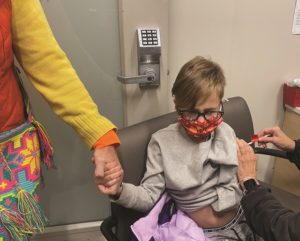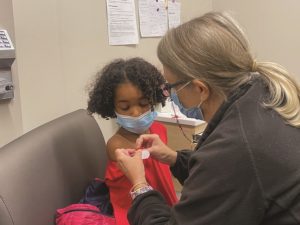PROVINCETOWN — With crayons and pages of coloring books scattered over the floor around them, Alaina and Kacey Vida sit in the waiting area of a Walgreens Pharmacy. It’s the Tuesday before Thanksgiving, and they are about to get their first Covid-19 vaccinations.
“I’m excited to get the shot because I want to be safe, and I’m nervous because I don’t really like shots,” says nine-year-old Alaina, clutching “Pandy,” a plush panda head. Her sister, seven-year-old Kacey, holds a toy Ariel a few feet away. “It’s important in order to stay healthy,” she adds.
While Covid-19 vaccines have been available for all adults since April, and for children 12 years or older since May, kids between 5 and 11 were not eligible for the shots until early November. The long-awaited authorization has provided relief for many Outer Cape families, opening up the opportunity for gatherings, vacations, and, in some cases, school.
“I’ll allow them to do more things once everybody’s protected,” says the girls’ mom, Tracy Kachtick-Anders. The family’s 12 kids (five of whom no longer live at home) have been getting vaccinated in batches, depending on their age and eligibility.
Kachtick-Anders was reluctant to put her son Wyatt, who has Down syndrome and is immunocompromised, back in the classroom. “My fear was that he can’t tell me where the cases are coming from, like if the cases were just the football team or people coming from Bourne,” she says. “He’s at risk, so I haven’t sent him to school.”
Now she’s feeling a sense of relief. She is planning a trip to Disney World, the first that the whole family would be able to take since the pandemic started almost two years ago. “I’m excited to sleep in the hotel,” says Kacey, smiling, “to go on the airplane, and to see Mickey Mouse, Minnie, Daisy Duck, Donald Duck, Goofy, Pluto, Ariel, Elsa, and Anna.”

The adolescent (or adult) and pediatric vaccines are not to be used interchangeably, according to the CDC. Pfizer is the only pharmaceutical or biotechnology company to have an approved pediatric vaccine, and no vaccine has yet been authorized for children younger than five. The pediatric vaccine is 91 percent effective in preventing Covid-19, according to a Mayo Clinic webpage.
“I felt very happy to get the vaccine,” says 10-year-old Sally Hay. “I soon won’t have to wear a mask as much as before.” She got her first dose with her seven-year-old sister, Nora, on Nov.18. They were both taken out of Wellfleet Elementary School and home-schooled for part of the pandemic when the family found remote learning to be too challenging. Since their full-time return to the classroom in April, “there’s been a lurking uneasiness,” says their mother, Elspeth Hay. “It’s nice to have the opportunity for them to get vaccinated after so long.”
Since the start of the pandemic, about 1.9 million children between 5 and 11 have been infected with the coronavirus. More than 8,300 have been hospitalized and 94 have died, according to data released by the CDC in November.
The death toll in the past year put Covid as one of the top 10 causes of death for this age group, says Outer Cape Health physician assistant Gretchen Eckel. In November, cases among children jumped 32 percent in a two-week period, according to a statement released by the American Academy of Pediatrics and the Children’s Hospital Association.
Eckel says she recommends that kids in the 5 to 11 age group get vaccinated, because, while the virus is milder in children, vaccinating more of the population will reduce transmission within the community and suppress the continued evolution of the virus into more dangerous variants.
Eckel also warns of post-Covid conditions that have been identified in children, such as long-term headaches and fatigue, and, in rarer cases, multisystem inflammatory syndrome, affecting different parts of the body, including vital organs. The condition is serious and, in some cases, deadly, Eckel says.
Effects at School
There are no active Covid cases at Wellfleet Elementary School, Truro Central School, or Provincetown Schools, according to school officials. So far this school year, there have been 15 cases at Wellfleet Elementary, four cases at Truro Central, and two cases in the Provincetown Schools.
A mask order from the Dept. of Elementary and Secondary Education remains in place “until a school has an 80-percent vaccination rate,” says Wellfleet Elementary School nurse Claudia Cope. She notes that vaccination status changes the conditions and protocols under which a student would be considered a close contact.
“One of the main reasons there are school nurses is to monitor the spread of contagious diseases, and to reduce the impact of things like this pandemic,” Provincetown Schools Nurse Mary-Beth Maloney says. “I’m finding a lot of parents are pro-vaccination in terms of how many people are calling me enthused, finding out they can get one close to home.”
Where to Go
“The main question I am getting from families is where to go,” Cope says.
Kachtick-Anders says she was not able to get local appointments for her children in time for their upcoming trip, so she drove them from Provincetown to Mashpee for their vaccinations.

Outer Cape Health Services CEO Patricia Nadle says there have been no shortages of vaccines or people manning the phones. “OCHS has been giving vaccines to the 5-to-11-year-olds since the second week of November, by appointment only, at all of our three health centers,” she says. So far, 40 to 50 pediatric vaccine doses have been given weekly across the three sites.
Eckel says that OCHS can’t offer vaccinations on demand, but they are available at weekly clinics that may vary by week. “There is a limited amount of vials that we’re not prepared to waste,” she says. Sally and Nora were two of the children who received vaccinations at one of those clinics.
Meanwhile, the schools are organizing their own clinics. The Provincetown Schools are having a vaccination clinic on Monday, Dec. 6, while Truro is in the process of planning one. “We’re hoping to announce a date for families very soon, whether it be at the school or the community center,” says Truro Central School Principal Patrick Riley.
Eli says a lot of his friends have gotten vaccinated, which has been exciting. “It also just makes me feel a little bit safer,” he adds.



